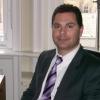Given a choice of effective treatment options most appropriately informed people, with all other factors being equal, would go for a non-surgical option. The risks and potential complications are likely to be far lower. The option for prostate artery embolisation (PAE) is therefore increasingly becoming the preferred route for patients suffering from enlarged prostate. Medical professionals are also coming together with urological surgeons teaming up with interventional radiologists in order to ensure patients benefit from access to these new procedures.
A collaboration between urologists and interventional radiologists
However, depending on individual circumstances PAE may not always be the best choice and so it is important that these medical specialists come together with the patient and act as 'honest brokers' and do not end up in medical 'turf wars'. Consultant urological surgeon, Mr Leye Ajayi and Consultant interventional radiologist, Dr Nigel Hacking are very much pioneering the way with this approach.
Treating BPH without surgery
A new website is now available for patients seeking direct access to prostate artery embolisation, or patients can also refer themselves for medical assessment via this link to Dr Hacking's clinic.
Patients are already benefiting from this professional collaboration and are they have written to Total Health providing full details of their own experiences. Indeed patients seem to be so pleased with the outcome that we continue to receive updates on progress following their PAE treatment.
For example, in his report Prostate artery embolisation - the patient's feedback, MWR says "The improvement has been dramatic. The flow rate has reduced to a controllable stream rather than a torrent and I have had no leakages worth commenting on, no more trouser and underpants smelling of urine. I can go for much longer periods without the urgency to urinate. I wake in the night at most once to relieve myself and now get a good night’s sleep of 7-8 hours. My total IPPS score now is 4. The embolisation thanks to the skill of Dr Hacking has been a total success. I am still living in a period of post embolisation elation. Please note I am currently 74 years of age and give my permission to use my age and initials".
As a more recent update received today MWR goes on to say;
"Just to let you know that my PAE has been a total success. I no longer need the oxybutanin to relax my bladder and I hardly ever wakes up in the night to urgently go for a pee. PAE is vastly better than having a TURPS op."
We are very grateful for this patient feedback along with the message that MWR is cycling through the local countryside and attaches this picture of the wild garlic growing in his local woods.








